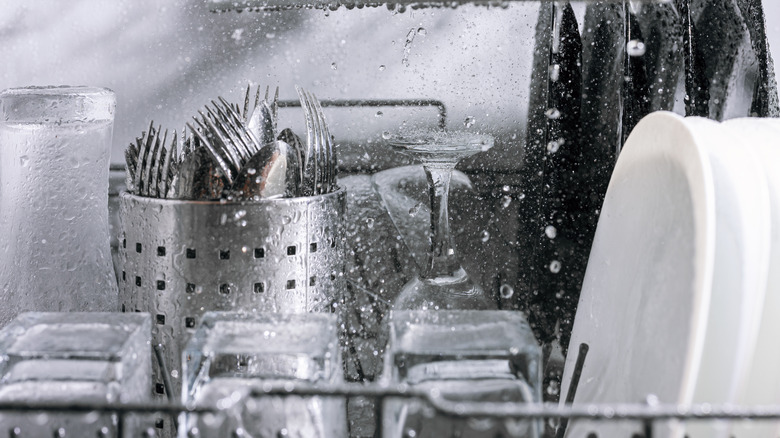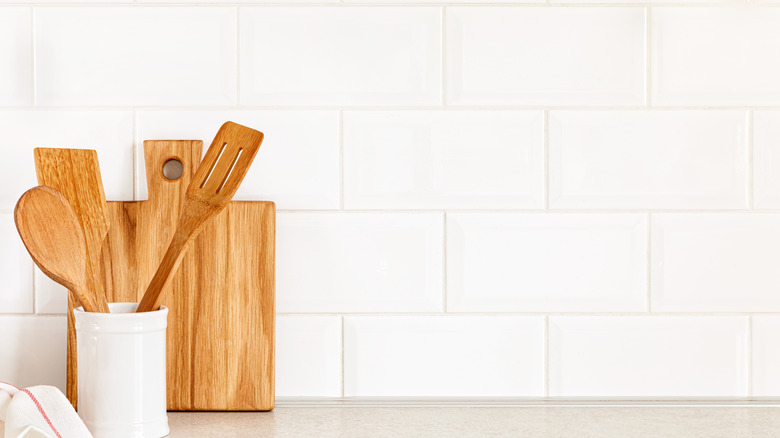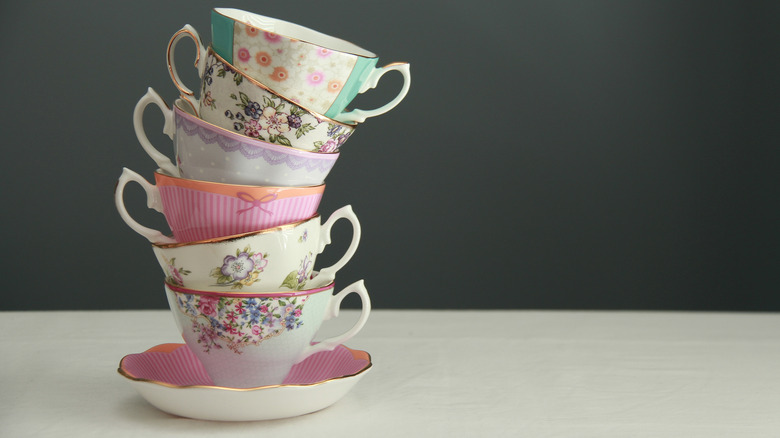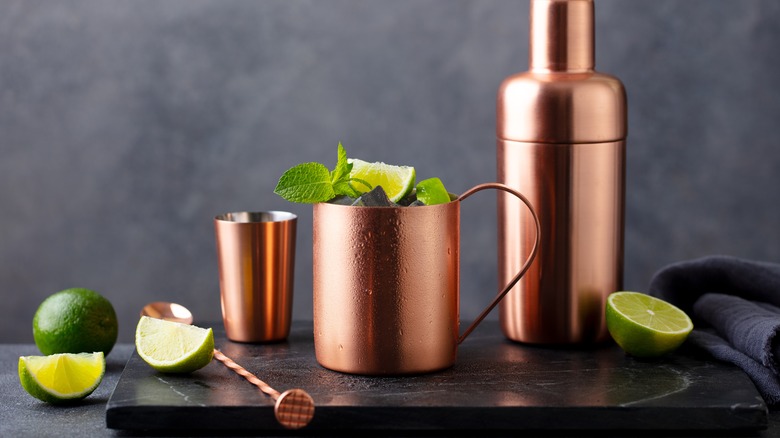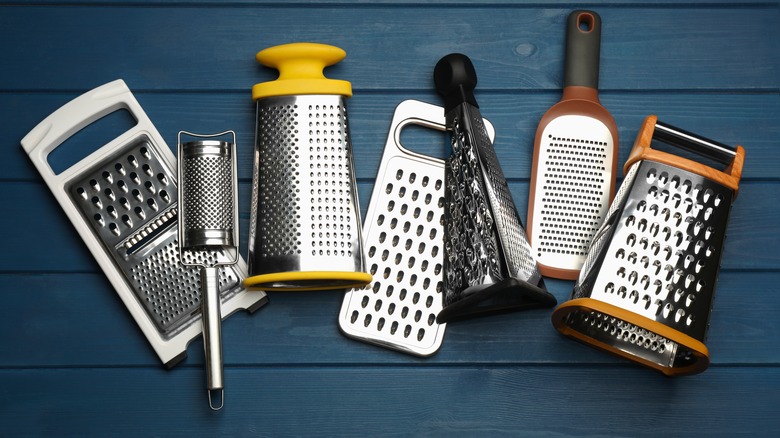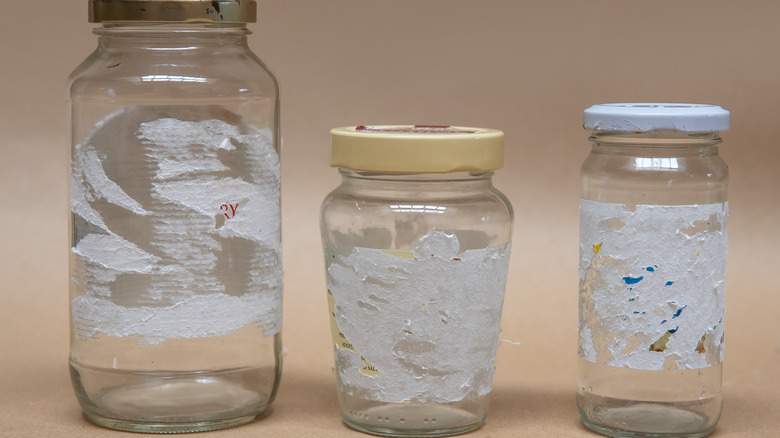5 Things You Should Never Put In Your Dishwasher
Gone are the days when you had to hand-wash dishes, a task that would take more time than you'd like after making a meal. The first dishwasher was invented in 1850 by a man named Joel Houghton, but the patent he created didn't work very well, according to Mission Restaurant Supply. It required an intelligent woman named Josephine Cochrane to play with the design to make it more efficient and practical. She eventually started the Garis-Cochrane Manufacturing Company, which we now know as KitchenAid.
A dishwasher can do so many things aside from just cleaning dishes. It can be used as a sanitizer for baby and pet items, and even clean things like shin guards and baseball caps. As long as you take the time to clean the dishwasher properly, it's an appliance that can really stand the test of time. However, before you start throwing in your kids' sweaty soccer gear in the cycle, let's talk about what should never go in the appliance.
Wooden utensils and cutting boards
While wooden spoons, spatulas, rolling pins, and cutting boards can technically go into the dishwasher, doing so will wear down the material. According to Finish, the high temperature can cause cracks and scratches, eventually making the wooden kitchenware no longer usable. If you have a wooden spoon that's been washed in the dishwasher versus one that has been hand-washed, you can feel the difference. To keep them in good condition, hand-wash any wooden items in warm, soapy water, and let them air-dry.
To really get a cutting board (especially one used to cut up raw meat or poultry) clean and germ-free, Cutting Board suggests using pure white vinegar to disinfect and clean it. If there is a smell, sprinkle a cup of baking powder on the board and pour vinegar over it. The oxidation process will get rid of any odors, then just let it dry and it's ready to use next time.
China and crystal
The fancy china or beautiful crystal that is sitting in your display cabinet is, unfortunately, not a friend of the dishwasher either. The hot water and detergent are meant to be aggressive in order to clean and disinfect everything, and china and crystal are just too delicate to handle it. The material can chip, leave a cloudy residue, or fade the design, especially if you wash it continuously, according to Don's Appliances. Hot, soapy water is your best bet to clean these materials.
If you are thinking you can't buy china that isn't dishwasher-safe, we've got good news. Thankfully, many types of fancy dinnerware is dishwasher and even microwave-safe, so you don't have to choose. According to A Practical Wedding, brands specializing in china, like Lenox, have sets that look timeless and elegant yet could give that traditional hand-wash-only set a run for its money. So we can have our cake and eat it too.
Copper
Copper is another enemy of the dishwasher. Instead of gradually losing its shine and durability, the damage happens on the very first cycle. The material is heat-conductive, which means it will tarnish, fade, and rust pretty easily, according to Dishwashing Secrets. Those cool copper mugs used to make a mean Moscow mule will need to be hand-washed separately, as well as your beautiful copper pots and pans. In addition, the same advice goes for brass items, too.
The best way to clean metal cookware is with hot, soapy water. While copper is super trendy in kitchens, showing up as knob accents and even sinks, according to K&M, it's best to be used for decor instead of cooking. If you love the look of copper mugs and bowls, we advise buying from a reputable source, as they will have a special lining that is safe to cook and drink from.
Cheese graters and citrus zesters
Those box graters and citrus zesters will last a lot longer with just some mild soap and water instead of putting it through a run in the dishwasher. The tiny blades will get dull over time, making you work harder to grate your ingredients. The same goes for zesters, which have even thinner blades. Another thing to keep in mind is that if food gets lodged in the blades, it might be tougher to get it out when it's had time in the dishwasher, as the dry cycle can bake food stuck in the blades, explains Above and Beyond Housekeeping.
Merry Maids suggests using a mixture of lemon, salt, and dishwasher liquid to clean and disinfect a box grater so it's free of germs and get it nice and clean. It's a gentler formula than the harsh dishwasher detergent, and the blades will stay strong and sharp for longer.
Sticky labels
A super handy trick to keep sticky labels from becoming a huge mess is to take them off before throwing them in the dishwasher. It's almost impossible to take them off after, so if you want to keep those food jars for gifts, fruit preserves, or homemade pickles, take the labels off first. The same idea goes for school water bottles that are dishwasher-safe. According to A-Abel, the stickers can clog the drain in the appliance, which is never a good thing.
But what if you can't take them off in the first place? Reusable Nation suggests some tips on how to remove those pesky stickers easily before throwing them in the dishwasher, including vinegar and cooking oil. Some tricks work better than others, so some trial and error might be needed to find the best method.
Not putting these problem items in the dishwasher will preserve the longevity and durability of some of your favorite household items, while prolonging the life of your appliance.
